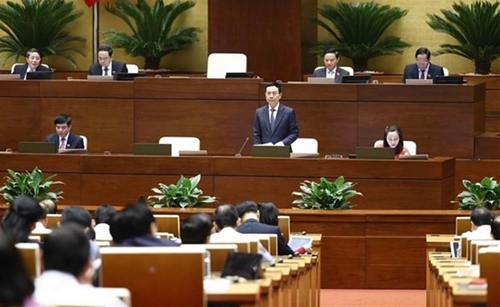At the ongoing fourth session of the 15th National Assembly, a number of deputies drew attention to digital transformation, which was identified by the Party and State as a new mode of development helping accelerate national industrialisation and modernisation. However, they pointed out that regulations, management, culture, human resources, citizens, enforcement, and budget for this regard are still lagging behind.
    |
 |
|
Minister of Information and Communications Nguyen Manh Hung responds to legislators' questions on November 4. |
Minister Hung said if Vietnam doesn’t quickly narrow this gap, it will not only fail to capitalise on chances of digital transformation but also face considerable risks during this process.
He noted that digital platforms are a breakthrough measure for promoting the national digital transformation. As digital data is considered a type of resource, his ministry (MIC) has focused on developing digital platforms.
In 2022, 52 digital platforms at the national level have been put into use. It is encouraging that they have recorded hundreds of millions of downloads this year, he went on.
Regarding the IT talent drain, the official said many countries view talent as the fundamental resource and the decisive factor of the mastery and application of science and technology.
To boost human resources in this field, it is necessary to develop digital universities, which will be a measure for quickly creating digital technology human resources, he opined.
Another measure being taken by MIC is to form online training platforms for different groups of learners. Among those platforms, “One Touch” has operated for six months, and 10 million Vietnamese people have used it to study, according to Hung.
Replying to a question about solutions to fake news in cyberspace, the minister said this is a hard nut to crack to not only Vietnam but also many other countries.
Authorities have issued regulations stipulating acts and responsibility of relevant sides, reduced the time limits for internet service providers to remove fake news and harmful content to 24 hours from 48 hours, and increased fines for fake news spreading by three-fold. However, the fines are equivalent to just one-tenth of those in other countries.
In the time ahead, MIC will propose the Government consider heavier fines to enhance deterrence against the act of spreading fake news, he said, noting the most fundamental solution is that the entire society, from ministries, sectors, organisations to individuals and families, takes an active and proactive part in this work.
Source: VNA